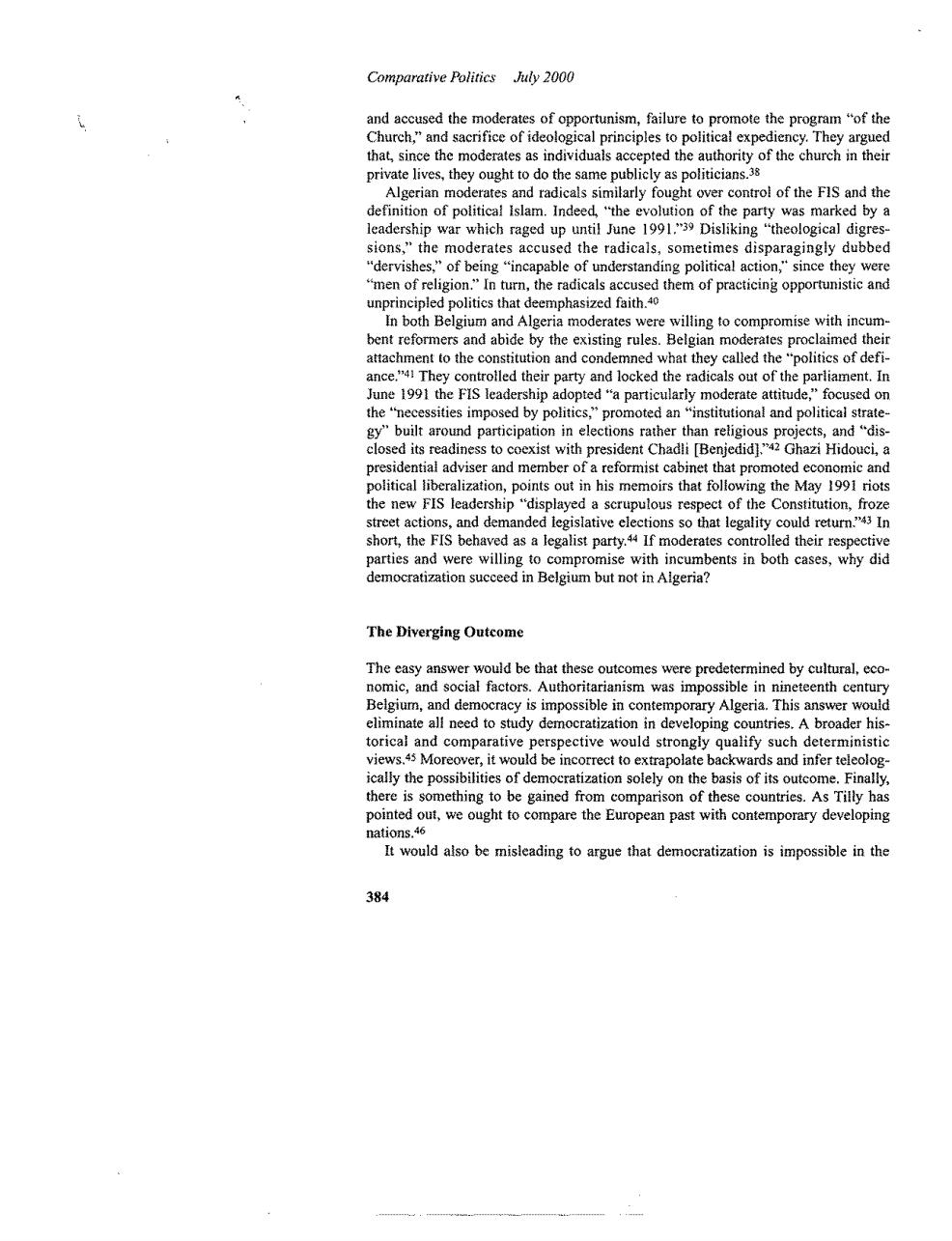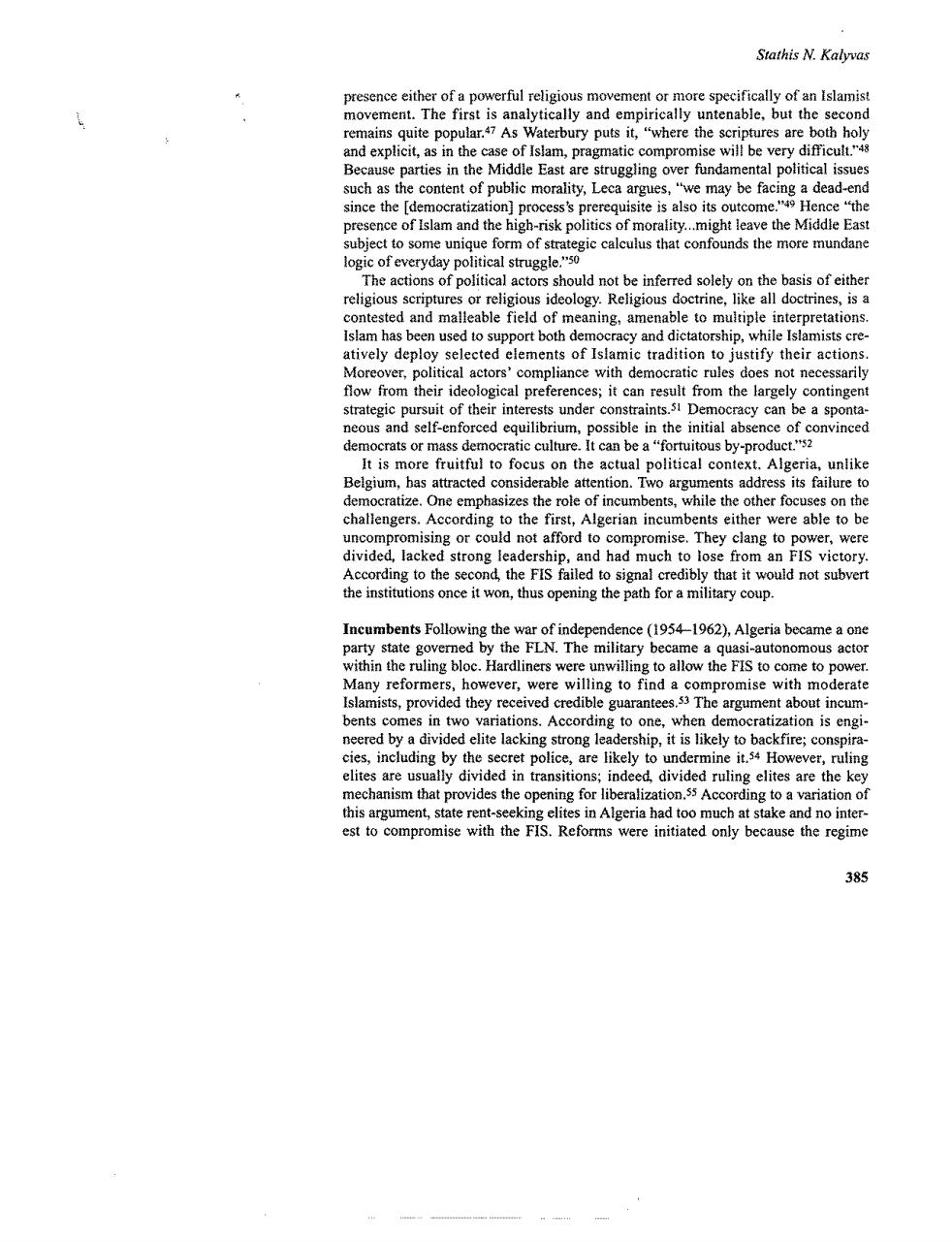
Comparative Politics July 2000 and accused the moderates of opportunism,failure to promote the program "of the Church,"and sacrifice of ideological principles to political expediency.They argued that,since the moderates as individuals accepted the authority of the church in their private lives,they ought to do the same publicly as politicians.38 Algerian moderates and radicals similarly fought over control of the FlS and the definition of political Islam.Indeed,"the evolution of the party was marked by a leadership war which raged up until June 1991."39 Disliking"theological digres- sions,"the moderates accused the radicals,sometimes disparagingly dubbed "dervishes,"of being "incapable of understanding political action,"since they were "men of religion."In turn,the radicals accused them of practicing opportunistic and unprincipled politics that deemphasized faith.40 In both Belgium and Algeria moderates were willing to compromise with incum- bent reformers and abide by the existing rules.Belgian moderates proclaimed their attachment to the constitution and condemned what they called the "politics of defi- ance."41 They controlled their party and locked the radicals out of the parliament.In June 1991 the FIS leadership adopted"a particularly moderate attitude,"focused on the "necessities imposed by politics,"promoted an"institutional and political strate- gy"built around participation in elections rather than religious projects,and"dis- closed its readiness to coexist with president Chadli [Benjedid]."42 Ghazi Hidouci,a presidential adviser and member of a reformist cabinet that promoted economie and political liberalization,points out in his memoirs that following the May 1991 riots the new FIS leadership"displayed a scrupulous respect of the Constitution,froze street actions,and demanded legislative elections so that legality could return."43 In short,the FIS behaved as a legalist party.44 If moderates controlled their respective parties and were willing to compromise with incumbents in both cases,why did democratization succeed in Belgium but not in Algeria? The Diverging Outcome The easy answer would be that these outcomes were predetermined by cultural,eco- nomic,and social factors.Authoritarianism was impossible in nineteenth century Belgium,and democracy is impossible in contemporary Algeria.This answer would eliminate all need to study democratization in developing countries.A broader his- torical and comparative perspective would strongly qualify such deterministic views.45 Moreover,it would be incorrect to extrapolate backwards and infer teleolog- ically the possibilities of democratization solely on the basis of its outcome.Finally, there is something to be gained from comparison of these countries.As Tilly has pointed out,we ought to compare the European past with contemporary developing nations.46 It would also be misleading to argue that democratization is impossible in the 384

Stathis N.Kalyvas presence either of a powerful religious movement or more specifically of an Islamist movement.The first is analytically and empirically untenable,but the second remains quite popular.47 As Waterbury puts it,"where the scriptures are both holy and explicit,as in the case of Islam,pragmatic compromise will be very difficult."48 Because parties in the Middle East are struggling over fundamental political issues such as the content of public morality,Leca argues,"we may be facing a dead-end since the [democratization]process's prerequisite is also its outcome."49 Hence "the presence of Islam and the high-risk politics of morality...might leave the Middle East subject to some unique form of strategic calculus that confounds the more mundane logic of everyday political struggle"50 The actions of political actors should not be inferred solely on the basis of either religious scriptures or religious ideology.Religious doctrine,like all doctrines,is a contested and malleable field of meaning,amenable to multiple interpretations. Islam has been used to support both democracy and dictatorship,while Islamists cre- atively deploy selected elements of Islamic tradition to justify their actions. Moreover,political actors'compliance with democratic rules does not necessarily flow from their ideological preferences;it can result from the largely contingent strategic pursuit of their interests under constraints.5i Democracy can be a sponta- neous and self-enforced equilibrium,possible in the initial absence of convinced democrats or mass democratic culture.It can be a"fortuitous by-product."32 It is more fruitful to focus on the actual political context.Algeria,unlike Belgium,has attracted considerable attention.Two arguments address its failure to democratize.One emphasizes the role of incumbents,while the other focuses on the challengers.According to the first,Algerian incumbents either were able to be uncompromising or could not afford to compromise.They clang to power,were divided,lacked strong leadership,and had much to lose from an FIS victory. According to the second,the FIS failed to signal credibly that it would not subvert the institutions once it won,thus opening the path for a military coup. Incumbents Following the war of independence(1954-1962),Algeria became a one party state governed by the FLN.The military became a quasi-autonomous actor within the ruling bloc.Hardliners were unwilling to allow the FIS to come to power. Many reformers,however,were willing to find a compromise with moderate Islamists,provided they received credible guarantees.53 The argument about incum- bents comes in two variations.According to one,when democratization is engi- neered by a divided elite lacking strong leadership,it is likely to backfire;conspira- cies,including by the secret police,are likely to undermine it.54 However,ruling elites are usually divided in transitions;indeed,divided ruling elites are the key mechanism that provides the opening for liberalization.s5 According to a variation of this argument,state rent-seeking elites in Algeria had too much at stake and no inter- est to compromise with the FIS.Reforms were initiated only because the regime 385